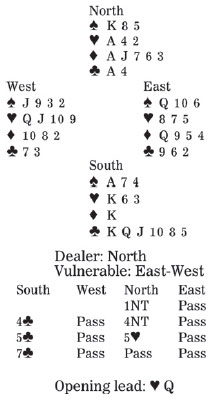Charles Buxton, a 19th century English brewer, philanthropist, writer and member of parliament, said, "Experience shows that success is due less to ability than to zeal. The winner is he who gives himself to his work, body and soul."
A successful bridge player has ability and zeal. Whether declarer or a defender, he counts winners, losers and high-card points. In today's deal, for example, how should South plan the play in seven clubs after West leads the heart queen?
That North hand was nearly too strong for a 15-17 no-trump because of its five-card suit, three aces and one king. (That ace-king number is typical for a two-no-trump opening.) South, giving due credit to his long suit, used two doses of Gerber before signing off in seven clubs.
Usually in a trump contract, you first count losers. However, in a grand slam you cannot afford any, so you should tally winners. Here, declarer starts with 12: two spades, two hearts, two diamonds and six clubs. From where may the extra winner come?
South must establish a third diamond trick, either because the queen falls in one or two rounds, or by finding the suit splitting 4-3.
Declarer carefully takes the first trick with his heart king, to retain the ace as a vital dummy entry. He cashes the club king and diamond king, then plays a trump to dummy's ace. After a diamond ruff, a third round of trumps, a spade to dummy's king, a second diamond ruff and a heart to the ace, South cashes the diamond ace and jack, on which he discards his two remaining major-suit



























 Raymond Zhou:
Raymond Zhou: Pauline D Loh:
Pauline D Loh: Hot Pot
Hot Pot Eco China
Eco China China Dream
China Dream China Face
China Face






